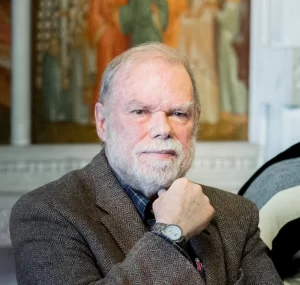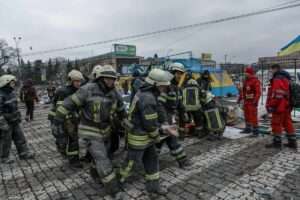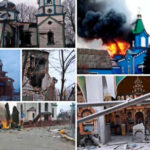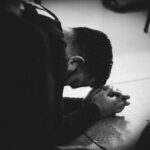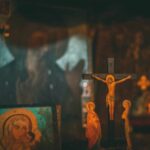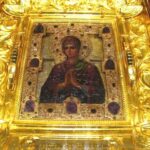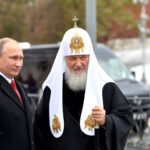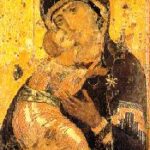Palm Sunday: Gateway to the Cross and Resurrection
by Fr. Mark Korban
The feast of Palm Sunday is a recreation of the historical events immediately preceding Jesus' death and resurrection. It's a prelude to Holy Week and, in particular, the suffering of Holy Friday. The Feast of Palms is a reminder of the victory to come in the resurrection, a victory achieved through the cross. Palm Sunday reminds us that there are no shortcuts to Pascha.
To understand this feast it is helpful to look at the first Book of Maccabees with its record of successful struggle against the Greco-Macedonian occupation of Israel. These events occurred less than two centuries before Palm Sunday. With the collaboration of some of the Jewish leaders, the Seleucid king, Antiochus Epiphanies, had defiled the Jewish temple by erecting a statue of Zeus in it as part of an attempt to Hellenize Jerusalem. Those who would not follow pagan custom were summarily arrested and executed. If discovered, mothers who circumcised their baby boys were killed along with their babies. One of the Jewish priests, Mattathias, along with his family, decided to resist the king's orders. Though a thousand of his followers were slaughtered at their desert retreat, Mattathias survived and with his sons organized a fighting force which today we would call a guerilla army. Following Mattathias' death, his son, Judah Maccabees, led the resistance. Through a series of raids and military campaigns, the Maccabean forces killed thousands of foreigners and eventually regained the temple, which they repaired, cleansed and reconsecrated. The remembrance of this event was instituted as the annual feast of Hanukkah. Interestingly enough, part of the celebration of Hanukkah involves the waving of palm branches.
Those welcoming Jesus to Jerusalem certainly had a vivid memory of the Maccabean uprising. Many were hoping for a messiah who would deliver them from Rome the way the Maccabees had delivered their ancestors from the Greeks. Judas Maccabees was viewed as a new Saul or David, even praised as "the savior of Israel." This is what the people wanted on that first Palm Sunday: another David, another Judas Maccabees. For many of those in the crowds, this was why they waved palms and shouted, "Hosanna!"
Jesus knew what they wanted but didn't give it to them, at least not what they expected.
See now, your king comes to you; he is victorious, he is triumphant,
humble and riding on a donkey, on a colt, the foal of a donkey. (Mt 21:5)
This prophecy is from Zechariah. But what a difference between this king and a worldly king entering Jerusalem astride a war horse! Jesus chooses to ride a humble donkey. In doing so he is showing the people and especially his disciples that he is a different kind of king.
Writing in the fourth century, St. John Chrysostom noted: "[Jesus] is not drawn in a chariot like other kings, not demanding a tribute. Nor surrounded by officers and guards. Then the people ask: 'What king has ever entered Jerusalem riding upon an ass?'"
His entry seems to border on theater. It is almost comedy. Jesus knows how weak and ridiculous he looks riding on a donkey as he makes his "triumphal" entry. It is the triumphal entry of a king such as the world has never seen before.
His act calls to mind his earlier words: "You know how the gentile rulers lord it over their subjects... It is not to be so among you." (Mt 20:25)
Jesus wants his followers to understand what true kingship is. It is humble. It serves. As Zechariah makes clear, it does not oppress or kill. Zechariah says in the very next verse after this Palm Sunday prophecy:
He will banish the chariot from Ephraim
and war horses from Jerusalem.
The bow of war will be banished.
He will proclaim peace for the nations. (Zech 9:10)
The chariot and war horse are instruments and symbols of war. The new king banishes both. He proclaims peace to the nations.
In three of the four Gospel accounts, after his entry, Jesus goes to the temple and cleanses it of its defilement as did the leaders of the rebellion recorded in the first Book of Maccabees, but unlike the Maccabees brothers, Jesus does it without harming anyone. His whip serves to drive out the cattle.
If ever there was an opportunity for Jesus to lead a violent uprising, this was it. The people were available and aroused. They were ready for violent action if called upon. But Jesus made no such call. His teaching was clear: destruction of enemies is not his way to freedom and liberation from oppression. In a few days he will show them - and us - his way. His way is the way of love, suffering and martyrdom. His way is not the violent love of slaughter and warfare but the nonviolent path of self-giving love. And although his way looks weak, "a folly to the Greeks and a stumbling block to the Jews," it doesn't end with martyrdom and the grave. Beyond martyrdom is the resurrection. The victory of Jesus' way of love is resurrection.
Another place where palm branches are waved is recorded in Revelations, chapter 7. Here we see the Christian martyrs standing in front of the throne of the Lamb, holding palms and shouting "victory" to the Lamb. This is the victory of love over hate, the victory of love in the face of murderous enemies. This kind of love leads to resurrection. This the martyrs experienced. In Christian art, the palm is a symbol of the martyrs.
There is a juxtaposition here. The people led by the Maccabees are waving palms after reclaiming the temple through slaughter and bloodshed. In contrast, Jesus and the martyrs reclaim the living temple, not through shedding the blood of others, but by shedding their own blood. The heroes of the Maccabees are military fighters. The heroes of the Church are the martyrs, the spiritual fighters. Jesus is offering a choice on Palm Sunday: the way of seeking freedom that leads to the misery and horror of warfare or the way of freedom that leads to the cross and resurrection: the victory of love over evil. The Hosanna-shouting crowds in Jerusalem wanted the way of the Maccabees, but Jesus says to his disciples, "Follow me, take up your cross and follow me." There is life and victory and freedom beyond the cross, but for the Christian in the fallen world, there is no way around the cross. There is no Pascha without Holy Friday.
The way of worldly kings is different than the way of Jesus the king. The Maccabees won back the temple from their Greek overlords through violence but they eventually lost it again to the Romans. The results that worldly kings and leaders offer are at best temporary. Jesus offers a way to put an end to evil permanently. He gives a choice, but if our decision is to be his followers, our choice must be his choice: the cross and martyrdom.
I recall a photo of a 12-year-old boy who lost both his arms in the initial bombing of Baghdad. He also lost both his parents and many of his relatives. He was lying in a hospital bed and asked the reporter who was photographing him: "Is this what you meant by bringing us freedom?" He was experiencing an attempt to bring freedom through violence and the imposition of suffering. It is a model that Jesus rejected. The freedom he gives us is self-sacrificial. He offers himself without causing others to suffer.
We don't completely understand how the loving acceptance of martyrdom brings about redemption and the overcoming of evil, but if we believe in Christ, if he believe he is the Second Person of the Trinity, then it is a matter of trust in him. We trust that he knows what he is talking about. After all, if Christ doesn't know what he's talking about, who does?
So as we wave branches on Palm Sunday, we would do well to keep in mind that we are crying "Hosanna" for the victory that comes through the cross, in whatever form the cross may take in our lives. The way of the cross that Jesus chose is our way too. We bear the cross that he asks us to carry and we also share in the joy of resurrection.
Fr. Mark Korban, his wife and six children have lived for many years "close to the earth," in a beautiful hay bale home far out in the country, which they built themselves. Fr. Mark is a carpenter. As a priest he is attached to The Sign of the Theotokos Church in Montreal, with the assignment as missionary priest to the Eastern Townships of Quebec. He has a small mission which meets in their home, in a little chapel they have built, dedicated to St. John the Evangelist.

